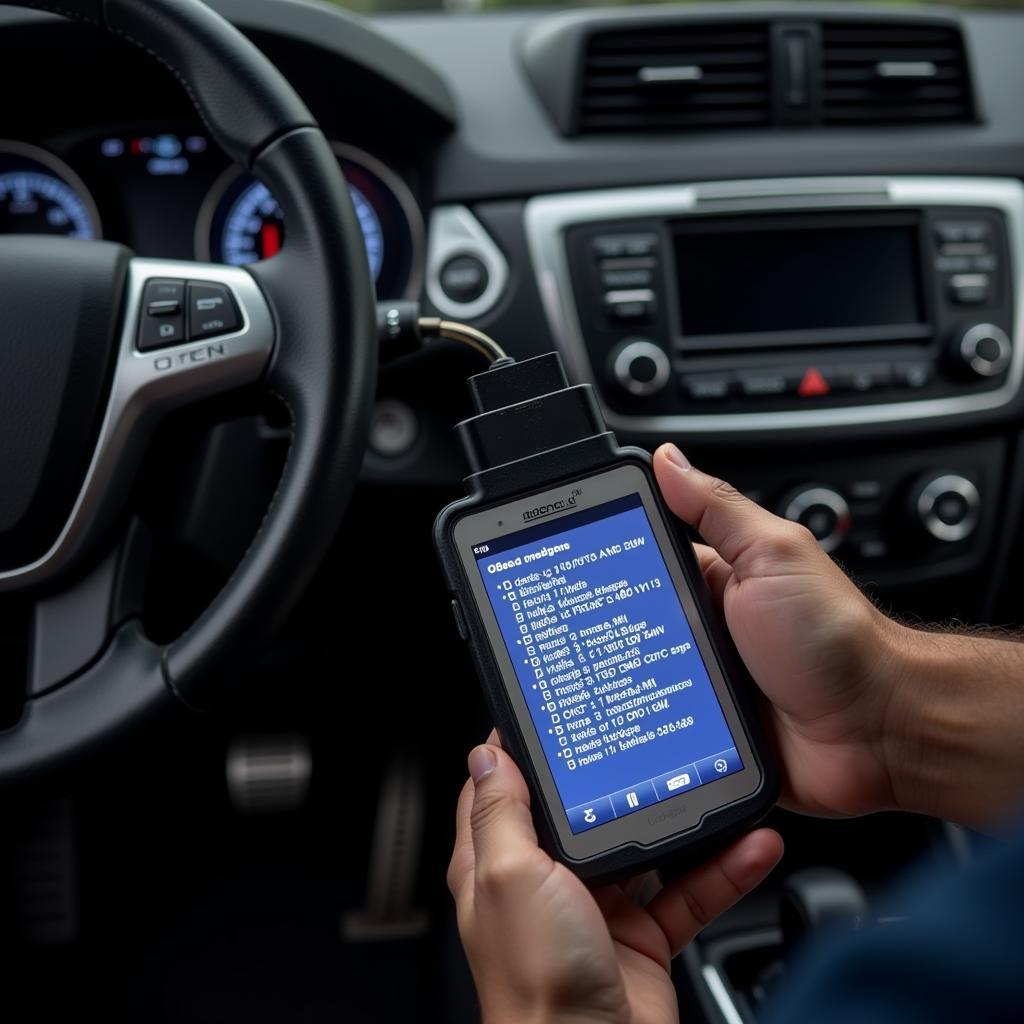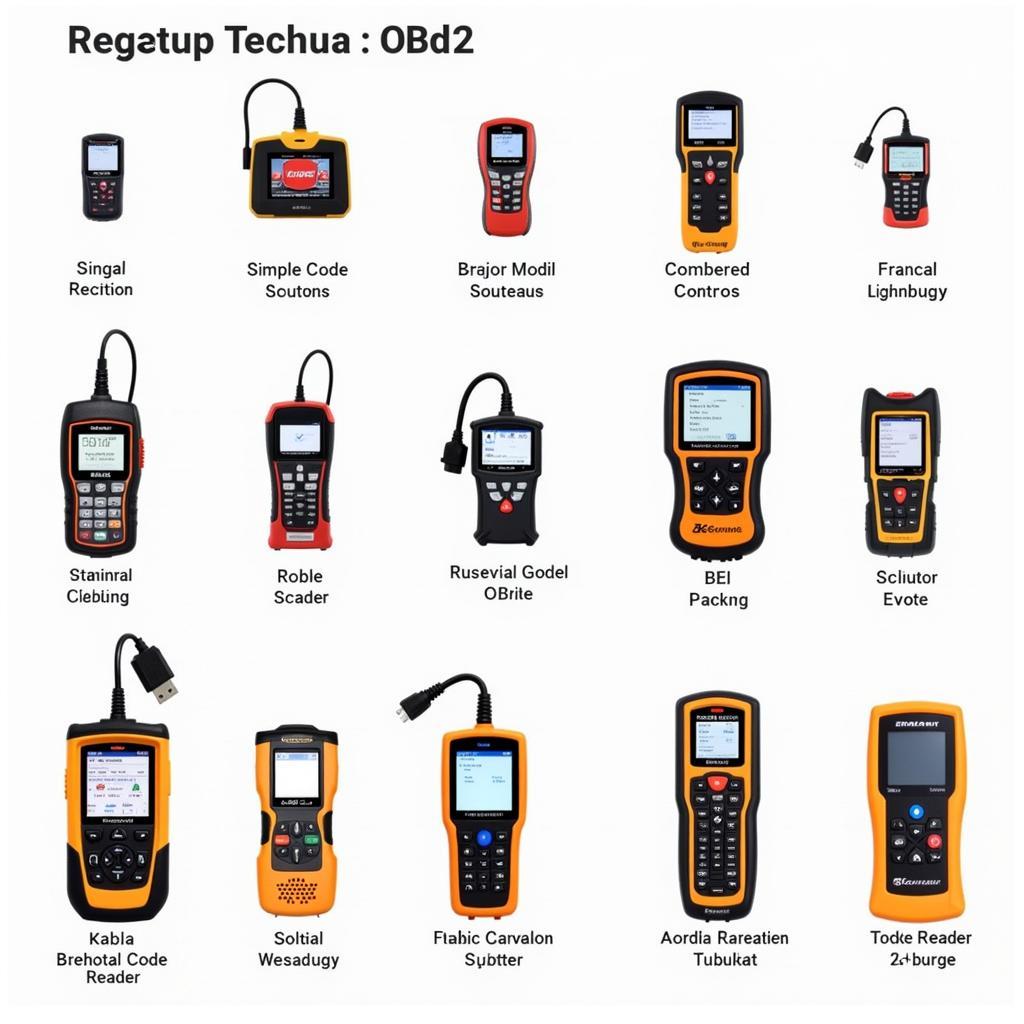You might be wondering, “Can I Run Diagnostics On My Car?” The answer is, more often than not, yes! With the rise of affordable OBD2 scanners and even smartphone apps, car diagnostics are no longer limited to professional mechanics. Whether you’re experiencing engine trouble, suspect an emissions issue, or simply want to understand your car better, running diagnostics yourself can be a great starting point.
What Does Running Diagnostics on My Car Actually Mean?
Running diagnostics essentially means accessing and interpreting the data stored in your car’s computer system, specifically the Engine Control Unit (ECU). This data, often in the form of Diagnostic Trouble Codes (DTCs), provides clues about the health of your car’s various systems.
 Mechanic running car diagnostics with an OBD2 scanner
Mechanic running car diagnostics with an OBD2 scanner
Why Would I Want to Run Diagnostics on My Car?
Running diagnostics yourself can be beneficial for several reasons:
- Early Detection: Identify potential issues before they become major (and expensive!) problems.
- Understanding Warning Lights: Decipher what that pesky “Check Engine” light really means.
- Saving Money: Potentially avoid unnecessary trips to the mechanic for simple fixes.
- Empowerment: Take control of your car’s maintenance and be an informed car owner.
How Can I Run Diagnostics on My Car?
There are a few ways to run diagnostics on your car:
1. OBD2 Scanners: These handheld devices plug into your car’s OBD2 port (usually located under the dashboard on the driver’s side) and can read and display DTCs. They vary in price and features, from basic code readers to advanced models offering live data streaming and analysis.
 Various OBD2 scanners for car diagnostics
Various OBD2 scanners for car diagnostics
2. Smartphone Apps: Several apps, available for both Android and iOS devices, connect to your car’s OBD2 port via Bluetooth or Wi-Fi adapters. These apps offer a user-friendly interface for reading and clearing codes, and some even provide additional features like performance monitoring and fuel economy tracking.
3. Professional Mechanics: If you’re uncomfortable DIYing or the issue seems complex, taking your car to a qualified mechanic is always a reliable option. They have access to more sophisticated diagnostic equipment and the expertise to interpret the results accurately.
What Should I Do After Running Car Diagnostics?
Finding DTCs doesn’t always mean a trip to the mechanic is necessary. You can take these steps:
- Write Down the Codes: Note the specific DTCs displayed on your scanner or app.
- Research the Codes: Use online resources like DiagFixPro to understand what each code means and its potential causes.
- Assess the Severity: Determine if the issue requires immediate attention or can wait.
- Consider DIY Fixes: For minor issues, research possible solutions and attempt repairs yourself.
- Consult a Professional: If unsure, seek advice from a trusted mechanic.
how to run a diagnostic on your car
Can I Reset the Check Engine Light After Running Diagnostics?
Yes, most OBD2 scanners and apps allow you to reset the check engine light. However, this only clears the code and the light will reappear if the underlying issue isn’t addressed.
“It’s important to remember that clearing the check engine light is not a fix. It’s like hitting the snooze button on an alarm clock – the problem will likely resurface,” warns John Davis, a senior automotive technician at ABC Auto Repair.
Are There Any Risks to Running Diagnostics on My Car Myself?
Generally, running car diagnostics yourself is safe. However, keep these points in mind:
- Misinterpretation: Incorrectly interpreting DTCs can lead to unnecessary repairs or overlooking a serious problem.
- Compatibility: Ensure the scanner or app you choose is compatible with your car’s make, model, and year.
- Damage: Be cautious when handling the OBD2 port and avoid forcing connections.
where can i get a diagnostic check on my car
Can Running Diagnostics on My Car Void My Warranty?
No, using an OBD2 scanner or app to run diagnostics yourself will not void your car’s warranty. The Magnuson-Moss Warranty Act protects consumers’ rights to perform simple maintenance on their vehicles.
Can Running Diagnostics Tell Me Everything About My Car’s Condition?
While car diagnostics are helpful, they’re not foolproof. DTCs provide clues, but further inspection by a qualified mechanic might be needed for a comprehensive diagnosis, especially for complex mechanical or electrical issues.
Conclusion
The ability to run diagnostics on your car is empowering and can save you time and money. By understanding how to access and interpret your car’s data, you can become a more informed and proactive car owner. Remember, while running diagnostics yourself is a valuable tool, consulting a professional is always recommended for complex issues.
FAQs
1. How often should I run diagnostics on my car? It’s a good practice to run diagnostics at least once a year or whenever your check engine light illuminates.
2. Can I use any OBD2 scanner on my car? Not necessarily. Ensure the scanner is compatible with your car’s make, model, and year.
3. What does it mean if no codes are found? It could indicate there are no current issues, or the problem isn’t triggering a code.
4. Can running diagnostics drain my car battery? No, running diagnostics for a short period shouldn’t drain your battery.
5. Where can I find reliable information about specific DTCs? Resources like DiagFixPro offer comprehensive explanations and potential solutions for various car diagnostic codes.
For further assistance or expert advice, feel free to contact our team via WhatsApp at +1(641)206-8880 or email us at [email protected]. We’re available 24/7 to help you with your car diagnostic needs.

Leave a Reply